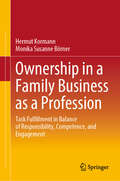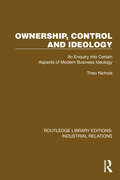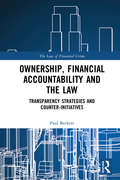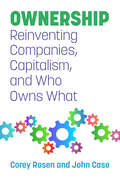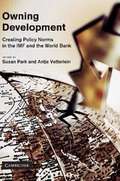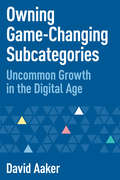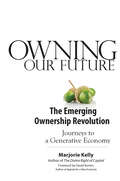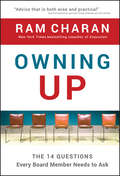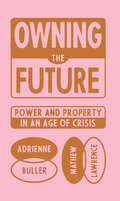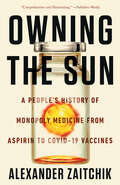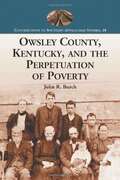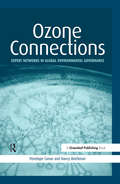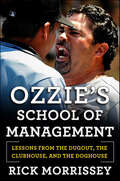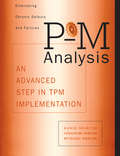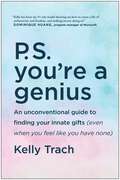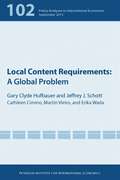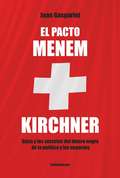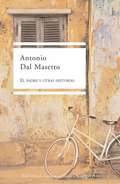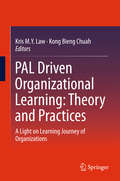- Table View
- List View
Ownership in a Family Business as a Profession: Task Fulfillment in Balance of Responsibility, Competence, and Engagement
by Hermut Kormann Monika Susanne BörnerThis book is aimed at owners, especially non-operating shareholders of family businesses. They work behind the scenes and carry significant responsibility for the success of the company. What characterizes good ownership? What competencies are essential for fulfilling their duties? How can succeeding shareholders also find guidance in the complex field of family businesses? Knowledgeable and practical, the authors outline all relevant areas of action. The book provides encouragement and support for developing a professional ownership structure and task distribution tailored to the individual situation and constellation of one's own family business.
Ownership, Control and Ideology: An Enquiry into Certain Aspects of Modern Business Ideology (Routledge Library Editions: Industrial Relations)
by Theo NicholsOwnership, Control and Ideology (1969) looks at the debate surrounding issues of ownership and control. It analyses a large body of existing literature from several disciplines, examining the ‘factual’ issues but also showing that the terminology of the debate also requires fundamental re-analysis. In addition an empirical study of directors and senior managers is used to explore the businessman’s definition of the situation.
Ownership, Financial Accountability and the Law: Transparency Strategies and Counter-Initiatives (The Law of Financial Crime)
by Paul BeckettThere is something visceral about ownership. This is mine; you can’t have it. This is mine; you can share it. This is ours. Try to find it. Contemporary literature and investigative journalism are showing that the scale of the problem of tax evasion, money laundering, organised crime, terrorism, bribery, corruption and gross human rights abuses is vast. Ownership – specifically, the quest to identify beneficial owners - has been chosen by national and international regulators as the touchstone, the litmus test in the fight back. An owner by definition must possess something for which they are financially accountable. But what is meant by "ownership"? This book explains why ownership is pivotal to accountability, and what ownership means in common law, civil law and Shariah law terms. It looks in detail at State, regional and international transparency strategies and at an equally powerful global private counter-initiative to promote beneficial ownership avoidance through the use of so-called "orphan structures". Where there is no owner, there is no accountability. The distinction between privacy and legitimate confidentiality on the one hand, and concealment on the other is explained with reference to commercial and trade law and practice, principles of corporate governance and applicable business human rights. This book introduces one further counter initiative: the phenomenon of transient ownership made possible through the use of cryptocurrency and the blockchain. The study concludes with a blueprint for action with recommendations addressed to states, international organisations, practitioners and other stakeholders.
Ownership: Reinventing Companies, Capitalism, and Who Owns What
by John Case Corey RosenWinner of the William Foote Whyte and Kathleen King Whyte Book Prize from the Rutgers Institute for the Study of Employee Ownership and Profit SharingEmployee ownership creates stronger companies, helps workers build wealth, and fosters a fairer, more stable society. In this book, two leading experts show how it works-and how it can be greatly expanded. Why are wages stagnant and wealth inequality increasing? One factor has inexplicably been left out: who owns the companies that drive the economy. Ownership gives people a claim to the fruits of free enterprise. Employee ownership gives workers-the people who have a stake in the company-a fair chance to benefit from their labors. In three simple parts, Corey Rosen and John Case create a powerful argument for why employee ownership is the answer to capitalism's crisis and how to implement it: 1. What's wrong with what we have-The authors explain why companies usually end up being sold off to investors and the often-horrific consequences that result for workers, communities, and the environment.2. How can we change things?-This section shows how overlooking ownership limits attempts to reform capitalism and why employee ownership is a realistic and practical way to save capitalism from its own excesses.3. Reinventing capitalism for the 21st century-This section describes how employee ownership has been done, is being done, and can be expanded and gives examples of companies of all sizes and sectors.
Owning Development: Creating Policy Norms in the IMF and the World Bank
by Susan Park Antje VetterleinAs pillars of the post-1945 international economic system, the International Monetary Fund (IMF) and the World Bank are central to global economic policy debates. This book examines policy change at the IMF and the World Bank, providing a constructivist account of how and why they take up ideas and translate them into policy, creating what we call 'policy norms'. The authors compare processes of policy emergence and change and, using archival and interview data, analyse nine policy areas including gender, debt relief, and tax and pension reform. Each chapter traces the policy norm process in order to shed light on the main sources and mechanisms for norm change within international organisations. Owning Development details the strength of these policy norms which emerge, then either stabilise or decline. The book establishes valuable insights into the strength of current development policies propounded by international organisations and the possibility for change.
Owning Game-Changing Subcategories: Uncommon Growth in the Digital Age
by David AakerOwning Game-Changing Subcategories is about creating organizational growth in the digital age by creating and owning game-changing subcategories fueled by digital.Owning Game-Changing Subcategories outlines the path to finding, managing, and leveraging new subcategories. In the digital age, the path has been made wider, shorter, and more frequently traveled. Throughout Owning Game-Changing Subcategories, David Aaker discusses certain aspects of the digital age that alter this path, such as E-commerce providing fast, inexpensive market access bypassing the cost of gaining distribution into storefront retailers or creating personal sales teams and social media and websites enabling communication on steroids in comparison with traditional use of advertising or events. Growth is not only a success measure but also creates energy and opportunity for customers and employees. And such growth almost never occurs with “my brand is better than your brand” marketing. Owning Game-Changing Subcategories explores the only ways to grow a business (with rare exceptions) which is to:develop new “must haves” that define a game-changing subcategory that provides a new or markedly superior buying or use experience or brand relationship to a core customer base;become the exemplar brand that represents the subcategory and drives its visibility, positioning, and success; and create barriers to competitors that could include “must-have” associations and a basis of relationships that go beyond functional benefits.
Owning Our Future: The Emerging Ownership Revolution
by Marjorie KellyAs long as businesses are set up to focus exclusively on maximizing financial income for the few, our economy will be locked into endless growth and widening inequality. But now people are experimenting with new forms of ownership, which Marjorie Kelly calls generative: aimed at creating the conditions for life for many generations to come. These designs may hold the key to the deep transformation our civilization needs. To understand these emerging alternatives, Kelly reports from all over the world, visiting a community-owned wind facility in Massachusetts, a lobster cooperative in Maine, a multibillion-dollar employee-owned department-store chain in London, a foundation-owned pharmaceutical company in Denmark, a farmer-owned dairy in Wisconsin, and other places where a hopeful new economy is being built. Along the way, she finds the five essential patterns of ownership design that make these models work.
Owning Up
by Ram Charan"This book is a most important contribution for both new and experienced directors, addressing contemporary corporate governance. The 14 practical questions represent the most vital issues that boards need to proactively address and are particularly crucial now as boards deal with the aftermath of the global financial tsunami. " -Thomas J. Neff, chairman, U. S. , Spencer Stuart "If Corporate America's board members had answered these questions, the crisis of '08 would have been avoided. The book is that powerful. It should be required reading in every boardroom, executive suite, and business school on the planet. This book with its singular wisdom could change the face of corporate governance-with huge dividends to shareholders and society. " -Ralph Whitworth, principal, Relational Investors LLC "Ram Charan always seems to get it right. Owning Up not only asks the right questions, it gives answers that can make a real difference for improving board performance. " -James M. Kilts, former chairman and CEO, The Gillette Company "As always, well-reasoned, insightful, and thought-provoking. A work that every director will find of value, particularly given the intense pressure of these unprecedented economic times. " -Professor Charles M. Elson, director of the John L. Weinberg Center for Corporate Governance at the University of Delaware "Here is the book that every corporate director needs today. With his decades of insider experience, Ram Charan brings more wisdom and insight to this subject than anyone else I know. " -Geoff Colvin, Fortune editor and author, Talent Is Overrated: What Really Separates World-Class Performers from Everybody Else
Owning the Future: Power and Property in an Age of Crisis
by Mathew Lawrence Adrienne BullerA radical manifesto for the transformation of post-pandemic politicsThe question of ownership is the critical fault line of our times. During the pandemic this issue has only become more divisive. Since March 2020 we have witnessed the extraordinary growth of asset manager capitalism and the explosive concentration of wealth within the hands of the already super-rich. This new oligarchy controls every part of our social and economics lives.In the face of crisis, the authors warn that mere redistribution within current forms of ownership is not enough; our goal must be to go beyond the limits of the current system, dominated by private enclosure and unequal ownership. Only by reimagining how our economy is owned and by whom can we address the crises of our time - from the fallout of the pandemic to ecological collapse - at their roots.Building from this insight, the authors argue the systemic change we need hinges on a new era of democratic ownership: a reinvention of the firm as a vehicle for collective endeavour and meeting social needs. Against the new oligarchy of the platform giants, a digital commons that uses our data for collective good, not private profit. In place of environmental devastation, a new agenda of decommodification - of both nature and needs - with a Green New Deal and collective stewardship of the planet&’s natural wealth. Together, these proposals offer a road map to owning the future, and building a better world.
Owning the Sun: A People's History of Monopoly Medicine from Aspirin to COVID-19 Vaccines
by Alexander ZaitchikFor readers of Bad Blood and Empire of Pain, an authoritative look at monopoly medicine from the dawn of patents through the race for COVID-19 vaccines and how the privatization of public science has prioritized profits over peopleOwning the Sun tells the story of one of the most contentious fights in human history: the legal right to produce lifesaving medicines. Medical science began as a discipline geared toward the betterment of all human life, but the merging of research with intellectual property and the rise of the pharmaceutical industry warped and eventually undermined its ethical foundations. Since World War II, federally funded research has facilitated most major medical breakthroughs, yet these drugs are often wholly controlled by price-gouging corporations with growing international ambitions. Why does the U.S. government fund the development of medical science in the name of the public only to relinquish exclusive rights to drug companies, and how does such a system impoverish us, weaken our responses to crises, and, as in the cases of AIDS and COVID-19, put the world at risk? Outlining how generations of public health and science advocates have attempted to hold the line against Big Pharma and their allies in government, Alexander Zaitchik&’s first-of-its-kind history documents the rise of privatized medicine in the United States and its subsequent globalization. From the controversial arrival of patent-wielding German drug firms in the late nineteenth century to present-day coordination between industry and philanthropic organizations—including the influential Bill & Melinda Gates Foundation—that stymie international efforts to vaccinate the world against COVID-19, Owning the Sun tells one of the most important and least understood histories of our time.
Owsley County, Kentucky, And The Perpetuation Of Poverty (Contributions To Southern Appalachian Studies #18)
by John R. BurchOwsley County, Kentucky, is well known by journalists, academics, and local historians as a quintessential example of rural poverty in Appalachia. This study identifies several reasons behind Owsley County's ongoing struggle with poverty, including the county's lack of natural resources, a poor transportation system, and a centralized socio-political power structure controlled by the entrenched elite. The author asserts that Owsley County's economic hardships are far from unique, but rather are representative of a significant number of Appalachian counties and towns. Several tables and appendices provide useful demographic, legislative, and agricultural data.
Ozark Feed and Ag Corporation: The ERP Decision
by Janice H. Hammond Paul Kalmbach Eric Bernstein"Sitting in his office on a cold night in December 2014, Christopher Page, CEO of Ozark Feed and Ag Corporation (Ozark), was trying to digest the results from the executive team meeting that had just taken place. He could hardly believe the numbers that were being discussed. It had been another record year for sales and profitability. The company’s 2014 revenue and income were each 10% higher than in 2013, despite competing in an industry that was growing at 1%–2% annually with thin margins. Now, the sales team was projecting even higher revenue growth for 2015—no small feat for Ozark, an animal feed manufacturing company with over 650 employees and $600 million in revenue."
Ozone Connections: Expert Networks in Global Environmental Governance
by Penelope Canan Nancy ReichmanIt is difficult to think of a more significant example of international cooperation to address a problem that threatened the health and wellbeing of the entire planet than the 1987 Montreal Protocol for the Elimination of Ozone-Depleting Substances. This breakthrough in international environmental governance has proved to be an extraordinary success beyond rhetoric or promises. In a dozen years, this international agreement went from an understanding of the need to act in a precautionary manner for mutual benefit to a successful worldwide effort to eliminate chemical substances harmful to our protective ozone layer. The production and consumption of most ozone-depleting substances has now been phased out in developed countries, with developing countries not far behind. What happened and why is of tremendous importance for those looking for guidance in the future, particularly those now involved in hugely complicated negotiations on climate change. The success of the Montreal Protocol has been linked to many factors such as political will, treaty flexibility and the recognition of equity issues raised by developing countries. While comprehensively analysing all of these success factors, Ozone Connections goes on to suggest that a social organization of global governance as typified by the protocol's Technical and Economic Assessment Panel (TEAP) was a unique – but replicable – decisive factor. The book argues that we need to understand how the implementation of complex global environmental agreements depends on the construction and exploitation of social connections among experts who act collectively to define solutions to environmental problems. This highly original and provoking thesis synthesises some of the more exciting social science concepts and methods, while refining our basic understanding of environmental social change and providing policy-makers with concrete success factors to replicate. This book will be essential reading for academics in the fields of sociology, political science, international relations, network studies, human communication, motivation, collaboration and leadership, as well as the burgeoning interdisciplinary field of environmental studies. Businesses will also find many applications for practical use. Finally, the many directly transferable lessons from ozone layer protection make this book a key addition to the growing literature on climate change.
Ozzie's School of Management: Lessons from the Dugout, the Clubhouse, and the Doghouse
by Rick MorrisseyGoing behind the scenes with Ozzie Guillen, one of baseball's most colorful and irrepressible managers, to reveal the hidden factors that create a winning teamWhen Ozzie Guillen opens his mouth, nobody knows what's going to come out. And that has made the former manager of the Miami Marlins endlessly entertaining to legions of baseball fans. In language that is often as profane as it is colorful, he will lash out not only at his team's opponents but also at his own players, reporters, fans, and most of all, himself. He is always getting himself in hot water, and he loves every minute of it.Yet for all the antics and controversy, Guillen was one of the game's best managers—a World Series champion and a perennial contender. This book opens the door on the secrets to his success.Ozzie's School of Management distills the ten commandments of managing, Guillen-style, which means no-holds-barred and leave your squeamishness at the door. The Chicago Sun-Times sports columnist Rick Morrissey, who built a strong rapport with Guillen during his eight years with the Chicago White Sox, takes us on a rollicking ride through Ozzie's world, shining a light on his sharp intellect, organizational insights, and changing moods, and showing that the most important part of managing occurs before the first pitch and after the last out.
P&G Canada: Old Company, New Tricks
by Brian J. Hall Tiffany Y. Chang Theresa Morin HallP&G Canada faces ongoing global pressure to increase productivity and reduce spending. Thom Lachman, President of P&G Canada, is seemingly out of options that will make a large enough impact without harming the business, until the idea of a radical space reduction strikes him. The case follows Lachman, working closely with Country HR Manager Jane Lewis, from idea inception to the eve of the company-wide transition to a dramatically scaled-down and reorganized office space. In particular, the case provides a basis for discussion surrounding employee motivation-specifically as it is affected by the change management process and workspaces, benefits versus perks, and sorting effects. A (B) case details the outcome of the office space transition.
P&G Canada: Old Company, New Tricks
by Brian J. Hall Tiffany Y. Chang Theresa Morin HallP&G Canada faces ongoing global pressure to increase productivity and reduce spending. Thom Lachman, President of P&G Canada, is seemingly out of options that will make a large enough impact without harming the business, until the idea of a radical space reduction strikes him. The case follows Lachman, working closely with Country HR Manager Jane Lewis, from idea inception to the eve of the company-wide transition to a dramatically scaled-down and reorganized office space. In particular, the case provides a basis for discussion surrounding employee motivation-specifically as it is affected by the change management process and workspaces, benefits versus perks, and sorting effects. A (B) case details the outcome of the office space transition.
P&G Canada: Old Company, New Tricks (B)
by Brian J. Hall Tiffany Y. Chang Theresa Morin HallThis is the (B) case to P&G Canada: Old Company, New Tricks. It details the outcome of the drastic reduction in office space from eight floors to three floors.
P&G Japan: The SK-II Globalization Project
by Christopher A. BartlettTraces changes in P&G's international strategy and structure, culminating in Organization 2005, a reorganization that places strategic emphasis on product innovation rather than geographic expansion and shifts power from local subsidiary to global business management. In the context of these changes introduced by Durk Jager, P&G's new CEO, Paolo de Cesare is transferred to Japan, where he takes over the recently turned-around beauty care business. Within the familiar Max Factor portfolio he inherits is SK-II, a fast-growing, highly profitable skin care product developed in Japan. Priced at over $100 a bottle, this is not a typical P&G product, but its successful introduction in Taiwan and Hong Kong has de Cesare thinking the brand has global potential. As the case closes, he is questioning whether he should take a proposal to the beauty care global business unit to expand into Mainland China and/or Europe.
P-M Analysis: AN ADVANCED STEP IN TPM IMPLEMENTATION
by Shirose Kunio Mitsugu Kaneda Yoshifumi KimuraIn this large-format implementation manual, TPM experts explain P-M Analysis. (A methodology that makes zero losses a reality in your TPM program.) P-M Analysis is designed to help your TPM teams analyze and eliminate chronic problems that have been neglected or unresolved in the past.Chronic quality defects and other chronic losses are hard to era
P.S. You're a Genius: An Unconventional Guide To Finding Your Innate Gifts (Even When You Feel Like You Have None)
by Kelly TrachDo you feel like you&’re doing it all and it&’s still not enough? Discover your shortcut to success in P.S. You&’re A Genius. After a lifetime of overachieving, aiming to be excellent at everything, and three failed tech startups in Silicon Valley, Kelly Trach was stirred by a simple question: What if I just did what I&’m good at? Now a six-figure business coach, Kelly poses the same question to you: What if you just did what you&’re good at? Despite conventional wisdom, the gifts and experience you need are already innate. Having that &“it factor&” or &“special ingredient&” isn&’t as elusive as you may think. P.S. You&’re a Genius takes you on a self-reflective journey to find your own gifts (especially when you don&’t feel &“gifted&” at all), asking questions like: How are your idols a reflection of your own genius? What are you great at that nobody taught you how to do? How is your darkest shadow your greatest gift? What have you been unexpectedly criticized for? Through these questions and more, you&’ll uncover the ways you naturally excel, relinquish the lie that you&’re not &“good enough,&” and discover how to convincingly convey your value to anyone. In the process, you&’ll unlock the gumption to go after what you really want and ditch the mindset blocks holding you back—because YOU have an inherent genius. You just have to find it.
PA 102 - Local Content Requirement: A Global Problem
by Gary Clyde Hufbauer Jeffrey J. Schott Cathleen Cimino Martin Vieiro Erika WadaLocal Content Requirements: A Global Problem, Local Content Requirements, LCR, LCRs, Gary Clyde Hufbauer, Gary Hufbauer, Jeffrey J. Schott, Jeffrey Schott, Cathleen Cimino, Martin Vieiro, Erika Wada, Peterson Institute for International Economics, Institute for International Economics, PIIE, 978-0-88132-680-2, 978-0-88132-681-9, Local, content, requirements, protectionist, protection, protectionism, tariff, non-tariff barriers, NTBs, WTO, policy, recession, trade, economy, economic, commerce, jobs, imports, Brazil, Canada, China, India, Nigeria, United States, Argentina, Australia, Austria, Azerbaijan, Chile, Denmark, European Union, France, Germany, Ghana, Greece, Hong Kong, Indonesia, Japan, Korea, Malaysia, Mongolia, Mexico, Morocco, Paraguay, Russia, Saudi Arabia, Singapore, South Africa, Spain, Taiwan, Tanzania, Thailand, Turkey, Uganda, Ukraine, United Kingdom, United Arab Emirates, Vietnam
PACTO MENEM - KIRCHNER, EL (EBOOK)
by Juan GaspariniEn qué se parecen escándalos como los de Thales, Skanska, Siemens, Alstom y el #tren bala#, la cuenta suiza de Menem, el Valijagate o los fondos de Santa Cruz? Existe un patrón de comportamiento entre empresas, actores políticos y del ámbito judicial? Son, todos ellos, piezas de un sistema coercitivo que hacen a la impunidad argentina en estos veinticinco años de democracia? El pacto suizo de no agresión entre Carlos Saúl Menem y Néstor Kirchner florece en este libro impecablemente documentado, en el que se revela la matriz helvética de las coimas, sin dudas la llave para muchos de estos interrogantes. Porque más allá de mutuas críticas ideológicas y de supuestos odios políticos, ambos ex presidentes han decidido, al menos con los dineros suizos, no pasar a mayores, evitar la confrontación. Por encima de convenciones internacionales, de reglamentos y de órganos de control, las firmas trasnacionales no han abandonado la estrategia de sobornar para competir en los mercados. Esta investigación periodística muestra cómo funcionan, dentro y fuera del país, las grandes coimas, y desnuda un hecho que, aun estando al alcance de la mano, la justicia prefiere ignorar: la red de la corrupción internacional y sus complicidades vernáculas no sólo no se ha alterado, sino que se han fortalecido en las últimas décadas.
PADRE Y OTRAS HISTORIAS, EL (EBOOK)
by Antonio Dal MasettoUn rutinario trayecto en bicicleta, la conversación con un amigo, el primer poema de amor parecen, enunciados, temas de redacción que solo pueden transmitirnos emociones comunes ya sentidas y dichas. No cuando los cuenta un narrador como Antonio Dal Masetto. Los pormenores y matices de una relación encuentran en el interprete sutil y lacónico, que parece apuntar los comentarios menos previsibles, los que siempre se nos escapan. Con una nostalgia que nunca amenaza bordear el sentimentalismo, con una economía que bien sabe el valor significativo del silencio, con unos pies de plomo que son la quintaesencia del pudor narrativo pero también el arma secreta de su poder de sugestión, Antonio Dal Masetto evoca anécdotas, articula escenas y arma si relatos que surgen o se esconden dentro de nítidas y entrañables evocaciones. No interpreta los hechos, pero se resigna a que los colores puros de la memoria personal pueden extinguirse en una crónica falseada por el tiempo, la pereza o la vocación de olvido de ciertas cosas. Quien lea El padre y otras historias encontrara en el muchos de los temas que informan la narrativa conocida del autor de Bosque. Y encontrara también inflexiones y matices secretos, una variedad de recursos que hacen de los relatos de Antonio Dal Masetto un territorio de admirable riqueza narrativa y emocional.
PAL Driven Organizational Learning: Theory and Practices
by Kris M. Y. Law Kong Bieng ChuahPresenting an innovative concept and approach for organization management, this book serves to document an organization's journey towards the ultimate goal of learning organization. This book also shares the experience on how a OL framework built on established learning theories, could be used effectively, overcoming many of the barriers in a real industrial setting. Utilizing a ready-to-use tool called Project Action Learning (PAL) to analyze real life case studies, the authors introduce a framework that allows teams of people to work and learn over the course of business projects. Equal emphasis is placed on the achievement of pre-set project outcomes and the learning objectives of the participants. In addition, a long term organizational learning strategy is put forward and the necessary supporting infrastructure, in the form of four 'PAL Pillars', is described. The concepts and development of the PAL driven Organizational Learning model are inspired by and grounded in, Western and Eastern business philosophies and case studies which offer important insights into the management of organizations who are keen to develop sustainable business practices.
